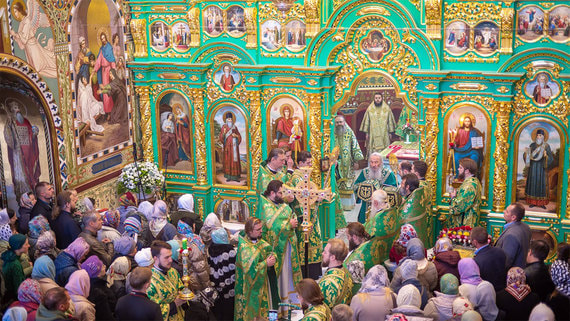The Verkhovna Rada supported the ban on the Ukrainian Orthodox Church
[ad_1]

On October 19, the Parliament of Ukraine adopted in the first reading a bill on the actual ban on the canonical Ukrainian Orthodox Church (UOC) in the country. 267 deputies (out of 450) voted for the document, with 226 required, 34 deputies voted against or abstained, wrote Yaroslav Zheleznyak, a deputy from the center-right party “Voice”, in his Telegram channel.
The government submitted the bill to the Verkhovna Rada on behalf of President Vladimir Zelensky back in January. It provides for a ban on the activities of religious organizations if the Ukrainian authorities consider that they are organizationally associated with the Russian Orthodox Church (ROC).
On the same day, representatives of the UOC criticized this bill, saying that it violates the Ukrainian constitution and does not comply with the European Convention on Human Rights, “since none of these documents provides for the possibility of banning the right to freedom of religion.” “Such a right may be limited only in the interests of protecting public order, public health and morals, or protecting the rights and freedoms of other people. Therefore, neither religious expert examination, nor criminal proceedings, nor national security are grounds not only for a ban, but also for restriction of the right to freedom of religion,” reports the information and educational department of the UOC.
Earlier, the World Council of Churches (WCC) also criticized the initiative of the Ukrainian authorities. According to Peter Prouv, director of the Commission of Churches on International Affairs, the bill “threatens to explode social unity in Ukraine, especially at a time when this unity is critically needed in the face of an external threat,” the Strana.ua Telegram channel reported on October 14, citing Prouv’s letter.
Since 2018, Kyiv has been actively pursuing a policy of ousting the UOC, including through encouraging the transfer of its communities to the jurisdiction of the Orthodox Church of Ukraine (OCU), formed in the same year. In January 2019, the Patriarchate of Constantinople awarded the OCU the status of an autocephalous church. In turn, the Russian Orthodox Church and the UOC do not recognize this decision, and subsequently they broke off eucharistic communion (the possibility of joint participation in the liturgy) with the Orthodox Church of Constantinople.
In addition, the authorities are depriving the UOC of the right to lease land for churches and are seizing their religious sites by force. In March, the Ukrainian leadership terminated the lease agreement for the Kiev Pechersk Lavra, and the court ordered the monks to transfer all the premises of the church to the Kiev Pechersk Lavra museum-reserve. In May 2022, the UOC declared its complete independence from the Russian Orthodox Church and condemned Russia’s military actions in Ukraine, but the persecution of church representatives continued anyway.
According to the latest data, the Security Service of Ukraine has opened 65 criminal cases against priests of the UOC, sanctions have been imposed against 17 clerics, and 19 hierarchs have been deprived of the country’s citizenship on charges of connections with the Russian Orthodox Church.
According to the Kyiv International Institute of Sociology, the UOC is the second Orthodox Church in Ukraine in terms of the number of adherents and the first in terms of the number of clergy, parishes, and monasteries. According to surveys by this institute, in January 2019, more than 15% of Orthodox Ukrainians identified themselves with the UOC, and almost 44% identified themselves with the OCU.
The bill actually talks about the ban on canonical Orthodoxy in Ukraine and its transition to a catacomb regime, notes Ivan Skorikov, head of the Ukraine department at the Institute of CIS Countries. The general political goal of the Zelensky government is a break with everything Russian, including in the religious sphere, the expert believes: “Therefore, the UOC, despite the help of the Armed Forces of Ukraine and flirting with the Ukrainian authorities, is considered as a fifth column and separatists subject to liquidation.”
According to the deputy chairman of the Synodal Department for Church Relations with Society and the Media of the Moscow Patriarchate, Vakhtang Kipshidze, the bill violates Ukrainian legislation and human rights. “The desire to destroy the UOC, deprive it of its shrines, expel believers from churches has become an obsessive thought of the Ukrainian leadership and parliament. This decision will actually not bring anything good to Ukrainian society,” the expert emphasized. He added that Kyiv does not care about the religious aspirations of the population, “they are simply fulfilling a foreign order to destroy everything that connects the peoples of historical Rus’.”
So far, Skorikov continues, the bill has only been adopted in the first reading, but the second will probably pass quickly. Its main points include not only the ban on the activities of clergy, but also the seizure of Orthodox shrines and monasteries. “In Ukraine, the property of religious organizations belongs to the communities, so if they suddenly decide to join the schismatic OCU, the UOC will lose it,” the expert concluded.
[ad_2]
Source link








